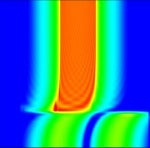Hard Condensed Matter

Condensed matter and materials physics seeks to understand the diverse and often unexpected phenomena that emerge when large numbers of constituents, such as electrons, atoms, or molecules, are brought together to form macroscopic matter. “Hard” condensed matter generally deals with materials with structural rigidity, such as crystalline solids, glasses, metals, insulators, and semiconductors. The term hard matter is commonly used to refer to matter governed by atomic/molecular forces and quantum mechanics.
Experimental and computational/theoretical research groups at Georgetown are interested in superconductivity, magnetism, and other novel states of hard matter that arise from correlations between constituent particles; structural, electronic, and transport properties of materials at both the macro and nano scales; and processes in which light interacts with and scatters off of solids.
Paola Barbara — superconductivity, superconducting devices, transport properties of nanowires and nanoscale electronic devices
Jim Freericks — strongly correlated electrons (charge and thermal transport and nonequilibrium effects), transport in multilayered nanostructures, resonant inelastic X-ray scattering, ultracold atoms in optical lattices (especially mixtures, dipolar molecules, and the Hubbard model) undergraduate understanding of quantum mechanics, student satisfaction with the major.
Amy Liu — structural, electronic, and vibrational properties of materials, including novel superconductors, thermoelectrics, charge-density-wave solids, clusters, and materials under pressure; assessment of undergraduate physics reform curricula and pedagogies
Kai Liu — Topological spin textures such as magnetic skyrmions and chiral domain walls; High magnetic anisotropy materials for magnetic recording and permanent magnets; Magneto-ionic control of metal/oxide interfaces; Low density metallic foams.
Gen Yin — The transport theory of charge and spin in hard condensed matters with non-trivial topology and quantum geometry. Material systems such as topological insulators, topological superconductors, chiral magnets and antiferromagnets are investigated for both the fundamental understanding and device applications.
